We have now settled into a routine with our new mission. This week all the elders received a letter from the First Presidency telling them their call had been changed and they are no longer part of the Ghana Cape Coast Mission but are now part of the Ivory Coast Abidjan mission. I think they were a little disappointed to receive a letter from the First Presidency and then have it only tell them what they already knew, but it is official anyway. Soeur Black and I did not receive one, but I guess we will assume we are part of the Ivory Coast Mission also unless or until someone tells us differently.
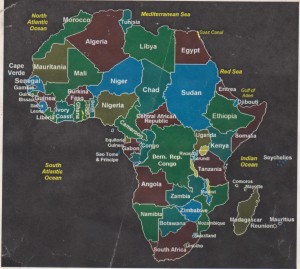 We have talked about our new Ivory Coast Mission in bits and pieces before but now that everything is in place, perhaps we can explain it a little more concisely. The West Africa Area is huge and I am not sure of the boundaries. Basically, the part we are concerned with is the part of Africa that has a southern coast line to the South Atlantic Ocean. On the far East is Nigeria then moving to the west you next have Benin where we are, then Togo, Ghana, Ivory Coast and Liberia where the continent makes a turn and the countries from there on pretty much have a Western coast line. Nigeria is a huge country with a huge population and I am told it is very densely populated with about 132 million people. Nigeria, Ghana and Liberia are all English speaking, whereas Benin, Togo and Ivory Coast are French speaking. French or English is the official language of the country, but Africa for centuries has been dominated by tribes, and still there are a lot of people that only speak the tribal language. Here in Benin that is Fon in this area, although there are other languages spoken in the country. Togo is Mena and Ghana is Fante and Twi, just to name a few. Most people prefer to speak the native language in everyday conversation and around here most casual conversation usually defaults to Fon. Most people, however, will also speak French or English or both. In all of Africa, I am told there is something over 2000 recorded languages and estimates as high as 4000 languages if you count all the tribal dialects. Quite a translation problem if you are going to have everything in the gospel in native languages. We are actually facing that now a little here. Frere Paul and his wife Honorine are planning to go to the temple. Frere Paul speaks Fon, French, and is making good progress on English but his wife only speaks Fon. President Desire is from Togo and doesn’t speak Fon. President Ayekoue doesn’t either. The temple session is not translated for Fon so we are trying to figure out ways of getting them interviewed and to the temple. I am sure it will work out okay but it does present problems.
We have talked about our new Ivory Coast Mission in bits and pieces before but now that everything is in place, perhaps we can explain it a little more concisely. The West Africa Area is huge and I am not sure of the boundaries. Basically, the part we are concerned with is the part of Africa that has a southern coast line to the South Atlantic Ocean. On the far East is Nigeria then moving to the west you next have Benin where we are, then Togo, Ghana, Ivory Coast and Liberia where the continent makes a turn and the countries from there on pretty much have a Western coast line. Nigeria is a huge country with a huge population and I am told it is very densely populated with about 132 million people. Nigeria, Ghana and Liberia are all English speaking, whereas Benin, Togo and Ivory Coast are French speaking. French or English is the official language of the country, but Africa for centuries has been dominated by tribes, and still there are a lot of people that only speak the tribal language. Here in Benin that is Fon in this area, although there are other languages spoken in the country. Togo is Mena and Ghana is Fante and Twi, just to name a few. Most people prefer to speak the native language in everyday conversation and around here most casual conversation usually defaults to Fon. Most people, however, will also speak French or English or both. In all of Africa, I am told there is something over 2000 recorded languages and estimates as high as 4000 languages if you count all the tribal dialects. Quite a translation problem if you are going to have everything in the gospel in native languages. We are actually facing that now a little here. Frere Paul and his wife Honorine are planning to go to the temple. Frere Paul speaks Fon, French, and is making good progress on English but his wife only speaks Fon. President Desire is from Togo and doesn’t speak Fon. President Ayekoue doesn’t either. The temple session is not translated for Fon so we are trying to figure out ways of getting them interviewed and to the temple. I am sure it will work out okay but it does present problems.
The church in this part of Africa was started first in Nigeria and Ghana, the English speaking countries on either side of us. That is where entire congregations joined the church during the late 80’s. It wasn’t unusual to have 100 or more people baptized at a time and some really strong people came into the Church. In both countries there are now wards and stakes and even a temple. Benin and Togo are sandwiched in between. The church was started in Togo in the late 1990’s, and the first missionaries arrived here in Benin in March of 2003. They were left in the Ghana Cape Coast mission even though they were French speaking countries, simply because President Dil and his wife both spoke French. When they finished their mission, it was natural to put them with Cote d’Ivoire even though it is further away since it is also French speaking. I understand that Benin and Togo used to be one country but were divided politically at some time. I don’t know the history of that.
So here we sit, kind of on a little island with our mission president a 2 day drive or a two hour flight away. Thank goodness for e-mail as that is our chief means of communication. We also have telephone service but the sound quality isn’t all that great, and when you are trying to understand French or a different English accent it is difficult enough when you have both ears and can see the person, let alone one ear to a telephone with crackling and background noise. President Ayekoue told us he is going to be using his couples more and seems to giving us more and more responsibility over what happens. I just hope he doesn’t give us so much rope that we end up hanging ourselves.
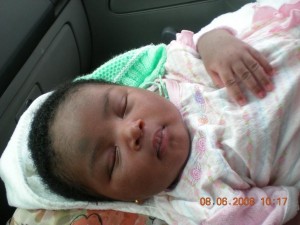 In our last week’s letter, we talked about the new little daughter of Pierre and Rosemond. We have been taking Rosemond and the baby to the hospital for check-ups and they were scheduled for another one on Wednesday. After arriving at the hospital, Pierre told me I needed to take the baby up to the third floor while Rosemond waited to see the doctor. Pierre left us there while he went to attend to the paying process and the next thing I knew we were being called into a dentist office for her to have her tongue clipped! The memories of having that done on Dave hit me like a blast from the past and wasn’t looking forward to that at all. She was sound asleep so the dentist opened her mouth, got his scissors and began to saw. I say saw as it would have helped if the scissors would have been sharp. What an angel she was as she just let out a little cry and went back to sleep. Africans start out being tough. The office looked like a blast from the past also, as it looked like the ones that terrorized me in my youth. It was not an example of sanitary dentistry either. Does anyone remember the old “rinse your mouth with this and spit it out” dentistry? Once again, I made Elder Black promise that if I need any serious medical attention, he will put me on the first plane for Paris, a short 6 hours away.
In our last week’s letter, we talked about the new little daughter of Pierre and Rosemond. We have been taking Rosemond and the baby to the hospital for check-ups and they were scheduled for another one on Wednesday. After arriving at the hospital, Pierre told me I needed to take the baby up to the third floor while Rosemond waited to see the doctor. Pierre left us there while he went to attend to the paying process and the next thing I knew we were being called into a dentist office for her to have her tongue clipped! The memories of having that done on Dave hit me like a blast from the past and wasn’t looking forward to that at all. She was sound asleep so the dentist opened her mouth, got his scissors and began to saw. I say saw as it would have helped if the scissors would have been sharp. What an angel she was as she just let out a little cry and went back to sleep. Africans start out being tough. The office looked like a blast from the past also, as it looked like the ones that terrorized me in my youth. It was not an example of sanitary dentistry either. Does anyone remember the old “rinse your mouth with this and spit it out” dentistry? Once again, I made Elder Black promise that if I need any serious medical attention, he will put me on the first plane for Paris, a short 6 hours away.
The weekend was another one of those cultural “firsts”. We told you a couple of weeks ago that the brother of Soeur Josephine had passed away. Around here they wait a few weeks before the funeral and it was scheduled for this weekend. I think the reason for the wait is that is just takes a while to get word out to the villages etc. with communication being what it is. It is a lengthy process to inform all of the relatives and raise enough money for the funeral. Sister Josephine invited us to be involved and also asked me to dedicate the grave. Last Sunday she invited us to go out the Bankole home where he lived in Cocotomey (8 or 10 miles from Cotonou) and meet some of the family. It was just a social gathering. On Friday evening we went out again. If we were at home, we would call it a viewing. Just after we arrived at the home, the funeral coach arrived with a police escort complete with sirens blowing and the casket was taken inside. A room inside the home was draped in white and decorated with colored lights and candles where the casket was open for the viewing. We (several of the branch members went with us) were invited into the room and spent a minute paying our respects. The casket was beautiful African wood. We were surprised to see that the body was dressed all in white. Afterwards we left and came home but I understand that the program went on all night with various music and cultural things.
On Saturday morning, the program continued in the little village of 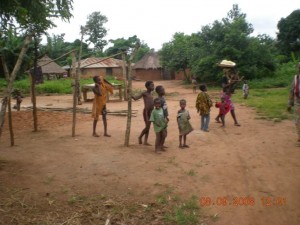 Ze. This is the family home of the Bancole family and the same village where we went a few weeks ago to look at the property Soeur Josephine is proposing to give to the church. Unfortunately, I was unable to find my way back to the village and missed the turnoff but after asking directions we finally found our way. A lot of the service was something like we might have in Blanding but some was also very different. There is quite a nice Catholic Church in the little village where the service was held. After everyone gathered near the grave site where the tents were set up for the dinner afterwards, we were invited to walk to the church. An African drum band complete with dancers, followed the procession. These people get really good of those drums and the volume is such that you should have heard it on your side of the ocean. It is really pretty neat sounding out in the jungle. I didn’t know if I dared take a picture or not. I didn’t want to be culturally insensitive. Actually we spent most of the day trying not to be culturally insensitive. There were exactly two pale faces in the group and quite a bit of attention seemed to be focused on Soeur Black and me or perhaps we were just a little self conscious. After inquiring if it would be alright, I took
Ze. This is the family home of the Bancole family and the same village where we went a few weeks ago to look at the property Soeur Josephine is proposing to give to the church. Unfortunately, I was unable to find my way back to the village and missed the turnoff but after asking directions we finally found our way. A lot of the service was something like we might have in Blanding but some was also very different. There is quite a nice Catholic Church in the little village where the service was held. After everyone gathered near the grave site where the tents were set up for the dinner afterwards, we were invited to walk to the church. An African drum band complete with dancers, followed the procession. These people get really good of those drums and the volume is such that you should have heard it on your side of the ocean. It is really pretty neat sounding out in the jungle. I didn’t know if I dared take a picture or not. I didn’t want to be culturally insensitive. Actually we spent most of the day trying not to be culturally insensitive. There were exactly two pale faces in the group and quite a bit of attention seemed to be focused on Soeur Black and me or perhaps we were just a little self conscious. After inquiring if it would be alright, I took 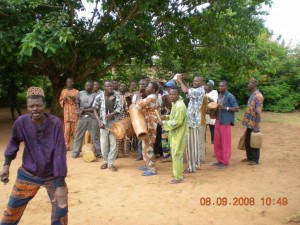 this picture. As soon as I did, they wanted me to take more pictures. The dancer out front was almost insisting that I take some pictures of him and his dancing. I found myself surrounded by the band and dancers and my support group (Soeur Black and the members who were with us) wandered off toward the church. I told them in my best French how good it sounded and thanked them and made my escape to join the others.
this picture. As soon as I did, they wanted me to take more pictures. The dancer out front was almost insisting that I take some pictures of him and his dancing. I found myself surrounded by the band and dancers and my support group (Soeur Black and the members who were with us) wandered off toward the church. I told them in my best French how good it sounded and thanked them and made my escape to join the others.
The blessing of the casket took place outside the church. We were told that the deceased was not a practicing member so that part of the ceremony took place outside. 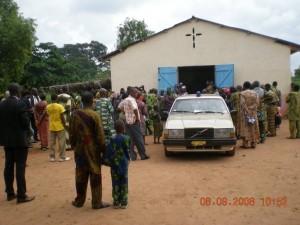 Afterward everyone went inside where the service was held. Probably 150 -200 people attended. The priest gave a talk but mostly in Fon. Soeur Josephine’s brother spoke and gave a talk not unlike you would hear in an LDS service. Also a young girl spoke in Fon and I didn’t figure out her connection. I suppose she was a family member but not one we got acquainted with. Soeur Josephine’s father was polygamist so we met all of her immediate brothers and sisters but not the half brothers and sisters. Also her husband was there and we got to meet him. He is the one we told you about who was in the Benin National assembly for 8 years. He and other members of his family kept away from the main group but received us very cordially.
Afterward everyone went inside where the service was held. Probably 150 -200 people attended. The priest gave a talk but mostly in Fon. Soeur Josephine’s brother spoke and gave a talk not unlike you would hear in an LDS service. Also a young girl spoke in Fon and I didn’t figure out her connection. I suppose she was a family member but not one we got acquainted with. Soeur Josephine’s father was polygamist so we met all of her immediate brothers and sisters but not the half brothers and sisters. Also her husband was there and we got to meet him. He is the one we told you about who was in the Benin National assembly for 8 years. He and other members of his family kept away from the main group but received us very cordially.
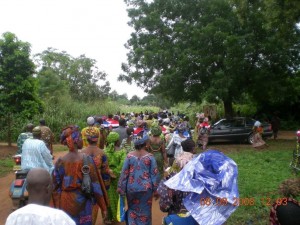 After the service, the group then followed the funeral coach back to the grave site where I was invited to dedicate the grave and the priest also gave his blessing. After the casket was lowered, it was important that each family member sprinkle some dirt on the casket. If you have ever been to a Navajo funeral, you will find that interesting. After that, it was back to the adjacent area where tents, chairs and tables had been set up and the celebration began complete with food, loud music, and a DJ welcoming everyone.
After the service, the group then followed the funeral coach back to the grave site where I was invited to dedicate the grave and the priest also gave his blessing. After the casket was lowered, it was important that each family member sprinkle some dirt on the casket. If you have ever been to a Navajo funeral, you will find that interesting. After that, it was back to the adjacent area where tents, chairs and tables had been set up and the celebration began complete with food, loud music, and a DJ welcoming everyone. 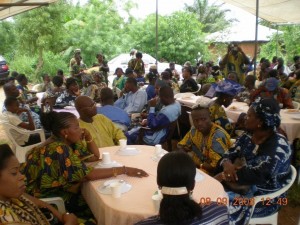 Soeur Black and I were trying our best to blend into the group but that was not to be. The DJ made sure on the loudspeaker that he welcomed the “Table of the Whites.” After we finished and decided to try to slip away unnoticed he also announced that the “whites were leaving now” and thanked the whites for coming and hoped that we had a good trip home etc. So much for trying to remain incognito. We went over and met Soeur Josephine’s Mother who was unable to come to the service, then made our escape to come home.
Soeur Black and I were trying our best to blend into the group but that was not to be. The DJ made sure on the loudspeaker that he welcomed the “Table of the Whites.” After we finished and decided to try to slip away unnoticed he also announced that the “whites were leaving now” and thanked the whites for coming and hoped that we had a good trip home etc. So much for trying to remain incognito. We went over and met Soeur Josephine’s Mother who was unable to come to the service, then made our escape to come home.
On the way out, it was important to the members who were with us to stop and buy some peanuts. Over here they boil the peanuts the way they do in the south but they are really quite good. Just hard to crack and get out of the shell. 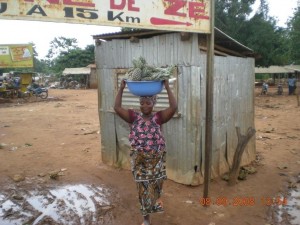 While we were waiting a lady came by from a little roadside stand where she was selling pineapple. I ordered 1000 cfa’s of pineapple (about $2.00 worth) and we ended up with about a half a pickup load. The picture is of the second pan full she got for us. I think the pineapple came to about $.15 cents each. We learned they are called “sweet bread” pineapples. You will notice in the picture they are green. This variety does not turn yellow like we are used to at home but they are as sweet as candy. We got home tired, but it was a very interesting day, especially with three Relief Society Sisters sitting in the back seat speaking Fon as fast as they could and laughing all the way home. It was good to see them having fun. We have one sister in the branch, Sister Lokossu who is apparently quite a character. She speaks mostly Fon, but whenever she is around, there is always a lot of laughter.
While we were waiting a lady came by from a little roadside stand where she was selling pineapple. I ordered 1000 cfa’s of pineapple (about $2.00 worth) and we ended up with about a half a pickup load. The picture is of the second pan full she got for us. I think the pineapple came to about $.15 cents each. We learned they are called “sweet bread” pineapples. You will notice in the picture they are green. This variety does not turn yellow like we are used to at home but they are as sweet as candy. We got home tired, but it was a very interesting day, especially with three Relief Society Sisters sitting in the back seat speaking Fon as fast as they could and laughing all the way home. It was good to see them having fun. We have one sister in the branch, Sister Lokossu who is apparently quite a character. She speaks mostly Fon, but whenever she is around, there is always a lot of laughter.